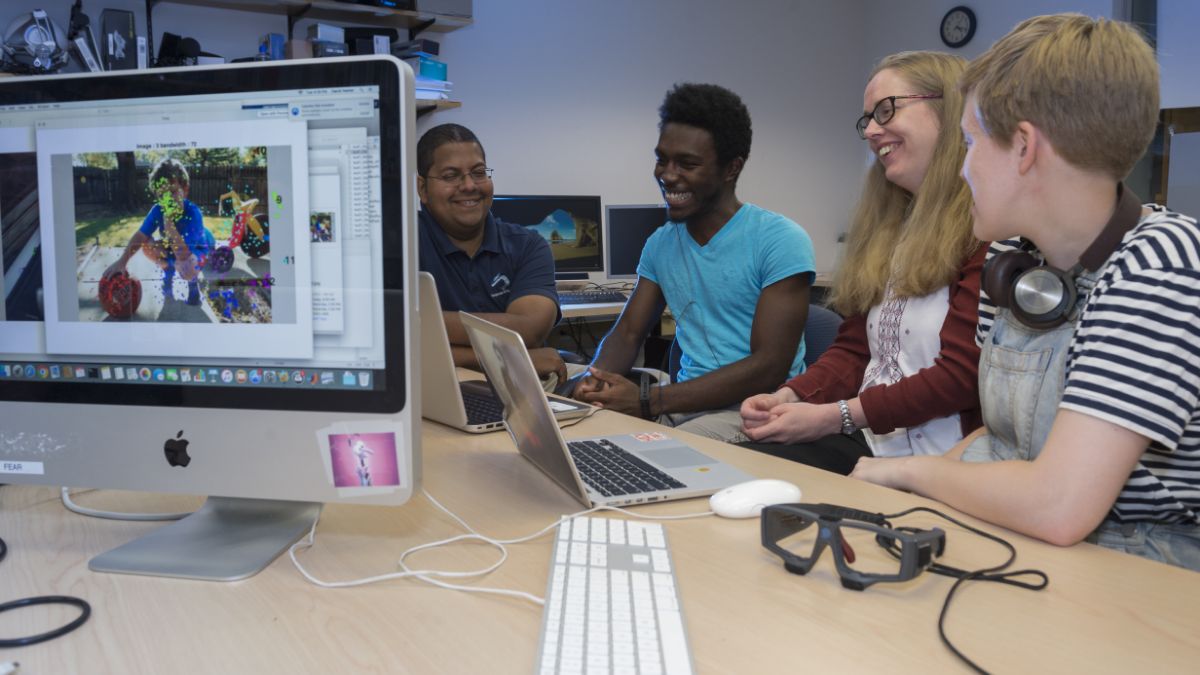Public Interest Technology-University Network

Public Interest Technology-
University Network
RIT is part of a national initiative advancing the role technology can play to make a difference in a rapidly changing society. The university is producing graduates who understand how technology can be integrated with public policy to drive Technology for Good.
RIT joined the Public Interest Technology – University Network (PIT-UN) in 2020, a national partnership of universities and colleges to build the field of public interest technology and encourage a new generation of civic-minded technologists. The PIT-UN Network seeks to equip tomorrow’s computer scientists, information architects, engineers, data scientists, designers, lawyers, policy experts, and social scientists with the skills to create public policy that centers on the needs of people and communities. The PIT-UN initiative is led by co-founders New America and the Ford Foundation.
RIT has a long history of developing technology applications that can serve the public good. Its students and faculty have an affinity for engaging in projects to help to improve society and solve global problems. The connection to the PIT-UN Network is a natural fit and one that will reap benefits for RIT. Through course development and degree options, innovative research projects, and experiential learning programs in public interest technology, RIT will produce graduates who understand the role technology can play in a rapidly changing society – and drive the technology toward applications for the public good.
PIT-UN Award Recipients
Each year, PIT-UN and the New America organization provide funding for projects that encourage the development of technology for societal good. For more information about PIT-UN Challenge grant opportunities and winners, visit the PIT Cases website.
2021 PIT-UN Awardee: Paul Shipman
Associate professor Paul Shipman, RIT College of Science, was awarded RIT’s first PIT-UN Challenge Grant to build a career/placement pipeline model for a working group of students and faculty who would like to work in public interest technology within tribal communities.
2022 PIT-UN Awardee: Justin Pelletier
Professor of practice in computing security, Justin Pelletier was awarded a PIT-UN Challenge Grant to help people underrepresented in the computing workforce launch new careers in cybersecurity. The nearly $180,000 grant will be used to develop a Cyber-Protection Apprenticeship pilot program that provides paid work experience to people entering the cybersecurity workforce. A diverse group of apprentices will be chosen from graduates of RIT’s Cybersecurity Bootcamp, including people from different backgrounds and those who are deaf and hard of hearing.
2023 PIT-UN Awardee: Nathan Williams
Assistant professor Nathan Williams, of RIT’s Golisano Institute for Sustainability, was awarded a PIT-UN Challenge Grant to develop renewable energy (RE) as Public Interest Technologies (PIT) to support Tribal sovereignty and energy transitions in Indigenous American Nations. The project, in collaboration with the Microgrid Systems Laboratory and Navajo Technical University, will aim to enable and support research on the topic of energy sovereignty through direct engagement with Tribes, to develop and disseminate educational tools within Tribal Nations, and to advocate for the adoption of RE as a PIT to reinforce the sovereignty of Indigenous Nations in the United States. RIT Sustainability Ph.D. student and recipient of the Outstanding Graduate Woman Award, Sherralyn Sneezer is also playing a critical role in the project, having helped to develop the proposal and engaging with partners from the Navajo Nation, of which she is a member.
Latest News
-
July 29, 2021
![Headshots of three people.]()
RIT faculty joins blog series on 'engineering for good'
Sarah Brownell, a senior lecturer in the Kate Gleason College of Engineering and director of RIT’s Grand Challenges Scholars Program, is a part of a multiuniversity blog series for Campus Compact’s Global Service Learning Blog.
-
November 18, 2020
![portrait of professor Paul Shipman.]()
RIT to establish public interest technologies group to collaborate with tribal communities
Paul Shipman, associate professor in the Thomas H. Gosnell School of Life Sciences, is the principal investigator and will use the $45,000 grant to build a career placement/pipeline model and build a working group at RIT of students and faculty who desire to work in PIT within tribal communities.
-
October 27, 2020
![several patriotic "I Voted" stickers.]()
Election Day Hackathon encourages people to use open technology for civic engagement
As the 2020 election results come in Nov. 3, civic hackers at RIT want to remind people about the power of technology and how it can be used for good. At RIT’s Election Day Hackathon, students, faculty, staff, and community members will analyze civic problems in the local community, state, and country and propose projects to address them.
Events
RIT’s PIT-UN initiative was featured during Imagine RIT 2021. Several projects showcased how the university is achieving “technology for good,” and the PIT-UN exhibits illustrate the philosophy of incorporating technology that is accessible, service-oriented, and relevant. Designs, applications, and products in the exhibits focus on how well-crafted technology can make a difference in people’s lives and in society overall.
People
Since the PIT-UN relationship was established in 2020, a core team of representatives from each of RIT's colleges and divisions has been built to engage faculty, staff, and students in campus projects. Their role is also to encourage these groups to seek collaborators from among the broader PIT-UN community on research projects, curriculum development, and experiences at the intersection of technology and public interest. The team meets quarterly, led by Doreen Edwards, dean of RIT’s Kate Gleason College of Engineering, and Barbara (BJ) Hoerner, executive director of Foundation Relations, University Advancement.
Leadership
College Liaisons






























